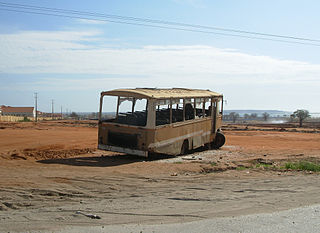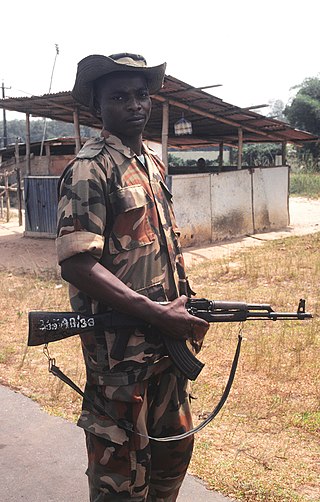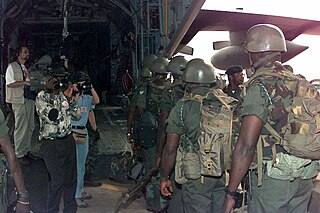
United Nations Security Council resolution 788, adopted unanimously on 19 November 1992, after determining that the deterioration of the situation in Liberia constituted a threat to international peace and security, the council imposed an arms embargo on the country for the purposes of establishing peace and stability.

United Nations Security Council Resolution 813, adopted unanimously on 26 March 1993, after reaffirming Resolution 788 (1992) and determining that the situation in Liberia constituted a threat to international peace and security, the Council condemned the failure of the parties in the country – the Armed Forces of Liberia, ULIMO, National Patriotic Front of Liberia and Independent National Patriotic Front of Liberia among others, to implement the Yamoussoukro IV Accord.

United Nations Security Council resolution 918 was adopted without a vote on 17 May 1994. After reaffirming all resolutions on the situation in Rwanda, particularly resolutions 872 (1993), 909 (1994) and 912 (1994), the Council expressed its alarm and condemnation at the continuing large-scale violence, and went on to impose an arms embargo on the country and authorise an expansion of the United Nations Assistance Mission for Rwanda (UNAMIR).
United Nations Security Council resolution 928, adopted unanimously on 20 June 1994, after reaffirming resolutions 812 (1993), 846 (1993) and 891 (1993) on the situation in Rwanda, the Council stressed the need to continue to implement the arms embargo on the country imposed in Resolution 918 (1994) and extended the mandate of the United Nations Observer Mission Uganda–Rwanda (UNOMUR) for a final period of three months until 21 September 1994.

United Nations Security Council resolution 937, adopted on 21 July 1994, after reaffirming resolutions 849 (1993), 854 (1993), 858 (1993), 876 (1993), 881 (1993), 892 (1993), 896 (1994), 901 (1994), 906 (1994) and 934 (1994), the Council expanded the United Nations Observer Mission in Georgia (UNOMIG) to include co-operation with the Commonwealth of Independent States (CIS) and extended its mandate until 13 January 1995.

United Nations Security Council resolution 952, adopted unanimously on 27 October 1994, after reaffirming Resolution 696 (1991) and all subsequent resolutions on Angola, the Council discussed the implementation of a ceasefire in the country and extended the mandate of the United Nations Angola Verification Mission II until 8 December 1994.

United Nations Security Council resolution 972, adopted unanimously on 13 January 1995, after reaffirming resolutions 813 (1993), 856 (1993), 866 (1993), 911 (1994) and 950 (1994), the council discussed the peace process in Liberia and extended the mandate of the United Nations Observer Mission in Liberia (UNOMIL) until 13 April 1995.

United Nations Security Council resolution 976, adopted unanimously on 8 February 1995, after reaffirming resolutions 696 (1991) and all subsequent resolutions on Angola, the Council authorised the establishment of a new peacekeeping mission in the country, the United Nations Angola Verification Mission III with an initial mandate ending on 8 August 1995.

United Nations Security Council resolution 985, adopted unanimously on 13 April 1995, after reaffirming resolutions 813 (1993), 856 (1993), 866 (1993), 911 (1994), 950 (1994) and 972 (1995), and 788 (1992) which imposed an arms embargo on Liberia, the council established a committee to monitor the implementation of the embargo and extended the mandate of the United Nations Observer Mission in Liberia (UNOMIL) until 30 June 1995.

United Nations Security Council resolution 1001, adopted unanimously on 30 June 1995, after reaffirming resolutions 813 (1993), 856 (1993), 866 (1993), 911 (1994), 950 (1994) and 972 (1995), and 985 (1995) on Liberia, the Council discussed the implementation of peace agreements in the country and extended the mandate of the United Nations Observer Mission in Liberia (UNOMIL) until 15 September 1995.

United Nations Security Council resolution 1011, adopted unanimously on 16 August 1995, after recalling resolutions 918 (1994), 997 (1995) and 1005 (1995) on the situation in Rwanda, the Council suspended the arms embargo against the Government of Rwanda.

United Nations Security Council resolution 1013, adopted unanimously on 7 September 1995, after recalling resolutions 918 (1994), 997 (1995) and 1011 (1995) on the situation in Rwanda, established an international commission of inquiry concerning arms flows to former Rwandan government forces in the Great Lakes region of Africa.

United Nations Security Council resolution 1014, adopted unanimously on 15 September 1995, after recalling all resolutions on the situation in Liberia, particularly 1001 (1995), the council discussed various aspects of the civil war and extended the mandate of the United Nations Observer Mission in Liberia (UNOMIL) until 31 January 1996.

United Nations Security Council resolution 1020, adopted unanimously on 10 November 1995, after recalling all resolutions on the situation in Liberia, particularly 1001 (1995), the Council discussed the implementation of the peace process during the First Liberian Civil War and adjusted the mandate of the United Nations Observer Mission in Liberia (UNOMIL) to include other functions.

United Nations Security Council resolution 1041, adopted unanimously on 29 January 1996, after recalling all resolutions on the situation in Liberia, particularly 1020 (1995), the Council extended the mandate of the United Nations Observer Mission in Liberia (UNOMIL) until 31 May 1996 and discussed efforts to restore stability in the country.

United Nations Security Council resolution 1059, adopted unanimously on 31 May 1996, after recalling all resolutions on the situation in Liberia, particularly Resolution 1041 (1996), the Council extended the mandate of the United Nations Observer Mission in Liberia (UNOMIL) until 31 August 1996 and discussed the security situation in the country.

United Nations Security Council resolution 1161, adopted unanimously on 9 April 1998, after recalling all previous resolutions on Rwanda, particularly resolutions 918 (1994), 997 (1995), 1011 (1995), 1013 (1995) and 1053 (1996), the Council reactivated the Commission of Inquiry concerning violations of the arms embargo against former Rwandan government forces.

United Nations Security Council Resolution 1952, adopted unanimously on November 29, 2010, after recalling previous resolutions on the situation in the Democratic Republic of the Congo, including resolutions 1807 (2008), 1857 (2008) and 1896 (2009), the Council renewed an arms embargo and related targeted sanctions for a further period until November 30, 2011.

United Nations Security Council resolution 1596, adopted unanimously on 18 April 2005, after recalling all previous resolutions on the situation in the Democratic Republic of the Congo, including resolutions 1493 (2003), 1533 (2004), 1552 (2004), 1565 (2004) and 1592 (2005), the council expanded the arms embargo to include all recipients of weapons in the country, and imposed a travel ban and asset freeze on those violating the embargo.

United Nations Security Council Resolution 1643, adopted unanimously on 15 December 2005, after recalling previous resolutions on the situation in Côte d'Ivoire, the Council extended an arms embargo and travel and financial restrictions against the country until 15 December 2006, and included a ban on the trade of diamonds.

















